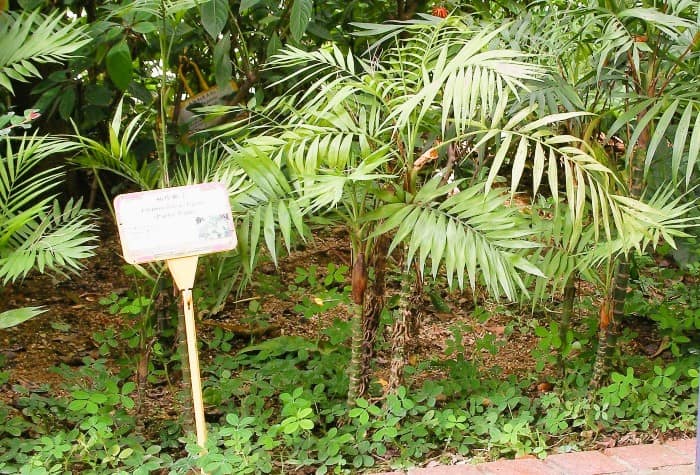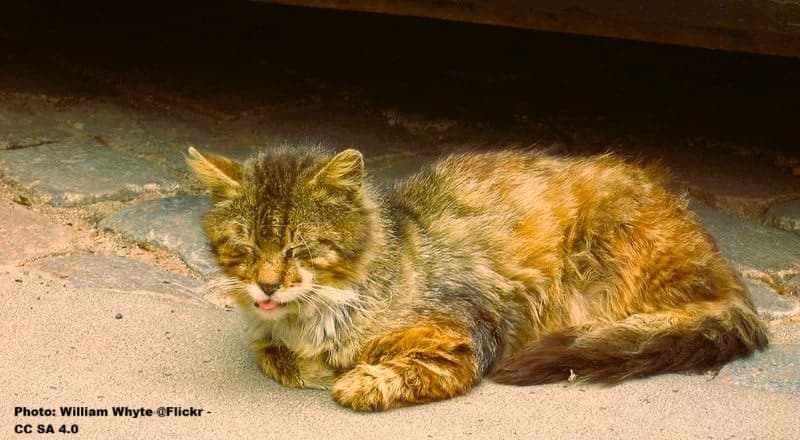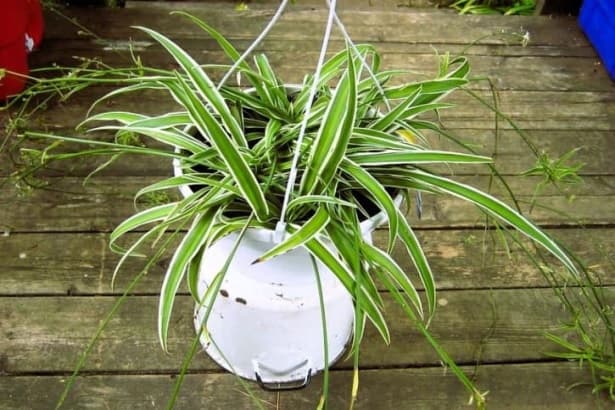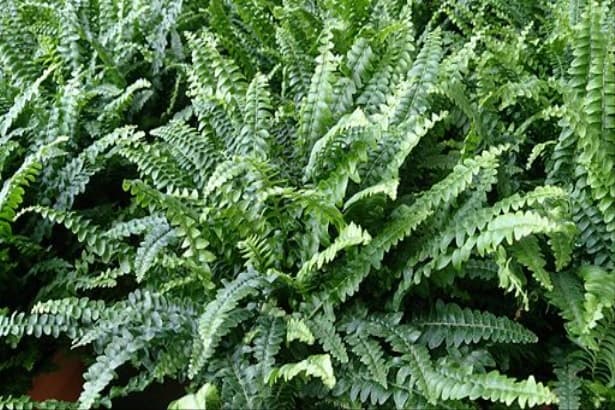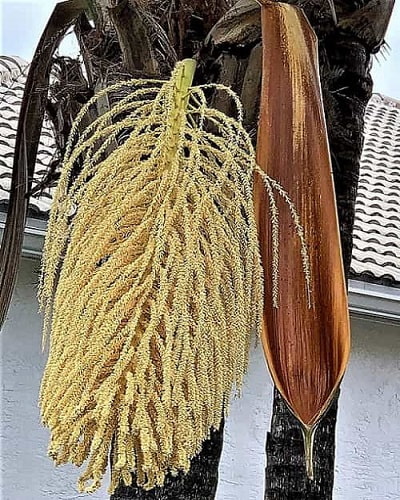- Home
- Palm Tree Problems
- Parlor Palm Cat Worry?
Parlor Palm Toxic to Cats
True Or False?
You're probably wondering if a Parlor Palm is toxic to cats?
Since you're a cat lover! Plus you're also a plant enthusiast? Right? So, ss your parlor palm is safe to have around your feline friend?
We all know how cats are curious creatures. Their instinct to investigate all their surroundings sometimes leading to trouble.
To keep your beloved pet safe, awareness of potential dangers lurking in your home is a good thing. Toxic plants are one of those worries. But is a parlor palm truly toxic to cats?
 Researching if a Parlor Palm is Toxic to Cats! 😉
Researching if a Parlor Palm is Toxic to Cats! 😉At Mission: Palm Trees
Palm lovers can soothe their palm-related searches and concerns. Our articles are intended to inform, while having fun, easily Finding What You Want or Need. Without unneeded shoptalk & tiring endless research. We Research For You!
You'd like to add greenery to your space without compromising your cat's health.
Your cat's well-being is also our top priority - we're cat-lovers, too! So we're here to help you make informed decisions about your indoor garden.
To help you, we'll get into the Parlor Palm world. Related to their possible effects on cats. By separating fact from fiction. For accurate information about whether a parlor palm is toxic to cats, or not.
FTC Disclosure: If you purchase via a link/ ad on this site, we may earn a small royalty. There's no added cost to you. Thanks much for any looks/ orders! Details>
Is a Parlor Palm Toxic to Cats?
Parlor Palms (Chamaedorea elegans), are a popular houseplant.
You've gotten one, or are Considering One to add a tropical touch to your home. So, are there toxic risks? There's some confusion around whether a Parlor Palm is toxic to cats.
We wonder why!
The simple truth is a Parlor Palm is not Extremely or Highly Toxic to cats, or even moderately toxic. Parlor Palms are non-toxic for felines. As well as dogs & humans.
Making them among Houseplant Palm Choices for pet owners.
They're safe to have around your cat. Typically not causing fatal harm if your cat tries to sample Parts of a Frond for a snack!
But remember: just because a plant is non-toxic doesn't mean it's totally safe for your cat.
Potential Risks of Parlor Palms for Cats
But still, consider there are some potential risks to keep in mind.
Some more likely, or more serious than others. Like: ICKY NAUSEA!
Your Curious Cat may try to nibble on the plant's leaves. That isn't ideal, because they could get tummy effects. Causing digestive upset.
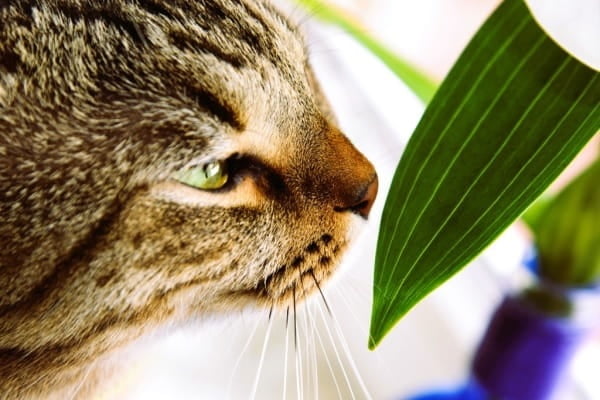 Hmmm - Does it look yummy??
Hmmm - Does it look yummy??The Latest Post at MPT
-
San Diego palm trees: History, Species, and Their SoCal Charm
Fascinated by San Diego palm trees? Discover their history, types, and why they're a staple of SoCal’s SD neighborhood scenery to inspire your landscape design.
Cat Rambunctiousness Dangers
Additionally, most cats love to play.
While jumping & chasing around, your cat could knock the palm over. For a possible injury. Slim chance, we think, but conceivable.
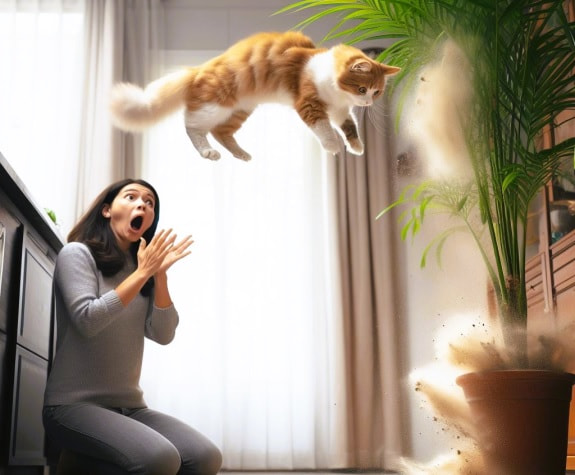 Is a Horrifying Experience Ahead Here?
Is a Horrifying Experience Ahead Here?Harsh Chemical May Harm Kitty
There's another potential risk to think about. Have you used pesticides or fertilizers on your Parlor Palm? Your pet might not notice. But these chemicals can be harmful to your cat.
Remember, pesticides are poisonous & must be used with caution. In other words, it's essential to follow the manufacturer's instructions carefully. For safe use, read those guidelines when purchasing, before using & if getting ready to store or dispose.
Try not to use them. But if you decide to use pesticides, keep your Parlor Palm away from your cat's reach. Until your pest issue is solved. Then you'll want to clean the treated plant areas.
Potted plants typically need fertilizing to address nutritional needs.
But the Parlor Palm grows slowly. You can apply Liquid Fertilizer, at the most, once/month. Dilute it well & follow directions. Cats won't be harmed, as long as they don't eat planting medium!
THIS CHOICE HAS TOTALLY BALANCED MACRONUTRIENTS
Seems to Work Well
Worries About Cats Eating Palm Fruit
The most serious problem could be Parlor Palm fruit.
Tiny bright yellow flowers grow on an inflorescence amidst the leaves. Providing fruit for the seeds. The Parlor Palm's round fruits are black when ripe. Berry-like at only 1/4 (0.25) inches (6.35 mm) in diameter.
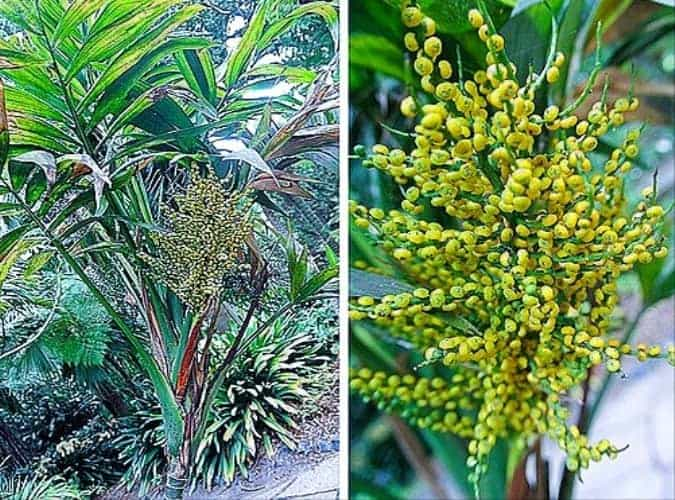 On Left: Parlor Palm with Unripe Fruits. On Right: Close-up Look at the fruits
On Left: Parlor Palm with Unripe Fruits. On Right: Close-up Look at the fruitsImage: Dick Culbert - Attribution 4.0 International
So fruits can be a problem.
In fact, this is cautionary for any in the Genus Chamaedorea.
- Part of their make-up is calcium oxalate crystals. It's a strong irritant. If your cat attempts to eat the fruit, or even lick it, they may suffer.
- These very tiny crystals have sharp, pin-like or cutting corners. Causing multiple tiny cuts to delicate inner mouth areas. Will these fruit pieces get past the kitty's mouth? Maybe, then the same will happen as it travels along. Ouch!!
- Effects are lots of pain, tissue swelling, & swallowing issues. Their meowing voice may sound oddly different for awhile.
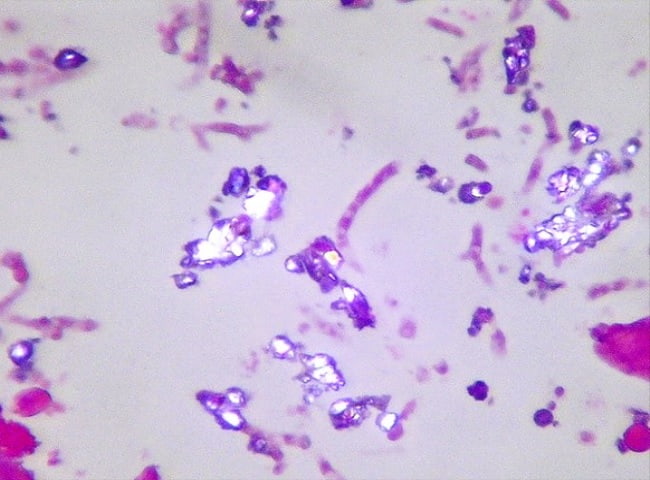 Calcium Oxalate Crystals - Microscopic view white under polarized light.
Calcium Oxalate Crystals - Microscopic view white under polarized light.Image: Dr. Yale Rosen Atlas @Flickr
Cats are unlikely to be poisoned by These Crystals. Why?
Your cat has a lot of "cat-sense" despite its curiosity. Kitty will quickly realize the error of eating these fruit chunks. So enough of it probably won't reach their stomach to cause true poisoning. Or system toxicity.
If you notice your cat has consumed this fruit, take immediate action. You'll probably need two people for this process. Plus Oven Mitts for hand protection.
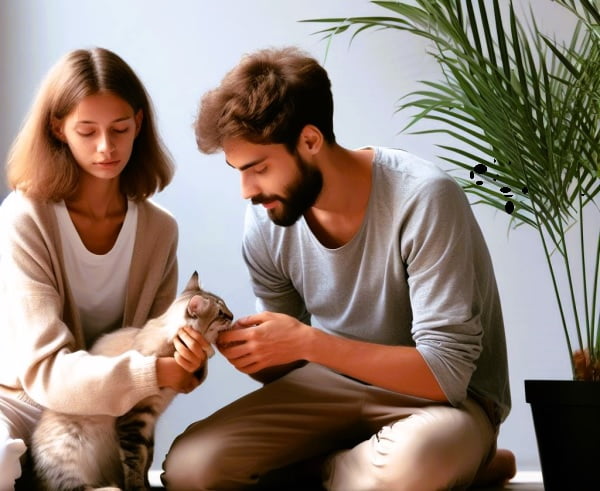
- Try opening your cat's mouth. With a small damp cloth wipe around reachable areas. Taking away any fruit remnants.
- Can you get your cat to drink some cool/cold water? I've known some cats who love ice. Will your cat down some crushed ice?
- BUT THEN, are there still worrisome issues? Is there excessive mouth swelling? Is kitty's breathing getting noisy? Then take your cat to a Veterinarian ASAP.
Problem With Parlor Palm Fruit Juices?
Did your cat closely inspect the fruit?
But immediately reject eating it? He/she may still have gotten some fruit juices touching the nose, skin or sensitive paw areas. That would be painful. There would be burning & possible swelling. What to do?
- Inspect for affected areas. Get a small basin of warm water & Dawn Dish Soap.
- Lather up a washcloth with the soap & clean where needed. Then use a different washcloth dripping with cool water to rinse.
- Do this again & again, to tamp down irritable effects. If your cat still seems distressed, don't hesitate to get with your Veterinarian.
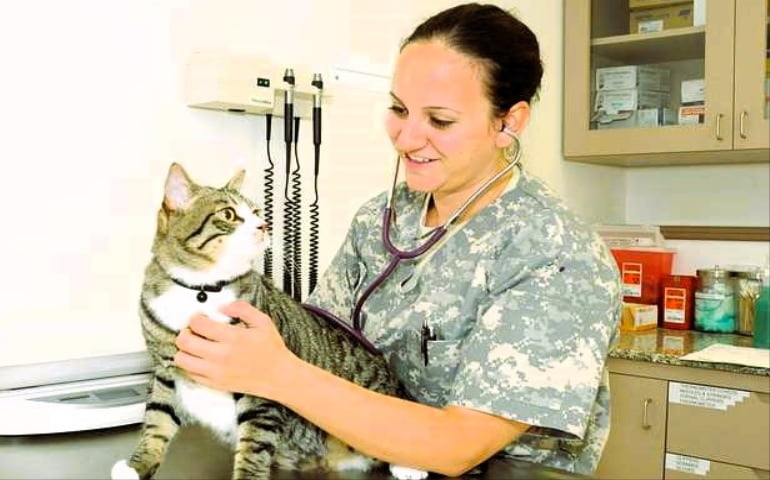 Maybe Just Consult Your Veterinarian For the Best Advice.
Maybe Just Consult Your Veterinarian For the Best Advice.You Might Have to Bring Your Cat in for an Exam
Signs of Poisoning in Cats
Do you worry for your cat?
Wanting to know symptoms to be aware of? In case kitty might swallow part of any toxic plant. Yes, in general, you should know the signs of poisoning in cats.
There can be a range of symptoms. It depends on what & how much was ingested. But common signs to look out for are:
- Vomiting and/or diarrhea. Plus appetite loss is likely.
- Lethargy and/or seizures
- Difficulty breathing
Notice any of these symptoms in your cat? Definitely get to veterinary care immediately.
Tips to Keep Cats Safe Around Houseplants
While many plants are safe for cats, we know you want to be cautious.
It's always good to take precautions to keep your feline friend safe. You might now be thinking if having a Parlor Palm is a good idea, when you have a cat.
We think you'd like some tips for keeping cats safe around houseplants! Right?
Keeping your houseplants out of reach is actually the most effective way to keep cats safe around them. Use hanging baskets or placement on shelves without cat-climbing access.
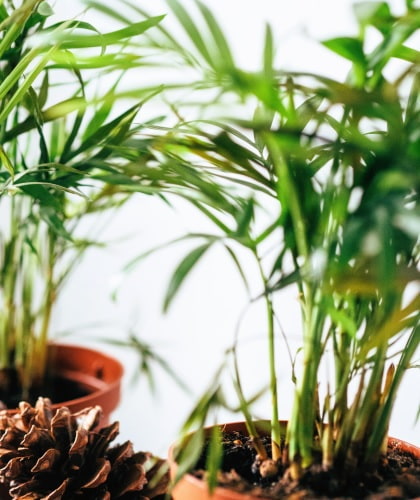 What to do with these plants for safety?
What to do with these plants for safety?Will that keep your plants away from curious paws?
For some felines, probably not! Not their fault, it's just their catsy nature. Right?!
If your cat is particularly curious, try using deterrents. That may keep them away from your Parlor Palm.
- Cats dislike the smell of citrus. Using a citrus spray near your plant might deter your curious kitty.
- Aluminum foil might work. You'd have to place it just right. Try locating Crafting Decorative Foil? For a better look.
- Felines are uncomfortable walking on aluminum foil. Making this technique an effective deterrent.
All this not worth it?
Instead select safer plants for your indoor garden. Those that are fully safe for cats. This way, you won't have to worry about potential toxicity or distressing harm to your feline friend.
- Spider Plants are easy to care for. They're great in hanging baskets! But importantly, they're safe for cats. Their small white flowers can add a pop of color to your space.
- Boston Ferns are popular for indoor gardens. With a tropical-ly look. They're safe around cats. They do love humidity, though. So maybe use them in your kitchen or bathroom.
Parlor Palm Cat Toxicity Takeaways
We know cats have a curious personality.
That may be a problem for some types of plants. If we look into the Parlor Palm, is it toxic to cats? In general it's safe around your pet.
But sometimes feline curiosity goes the extra mile. Problems arise if your kitty gets ahold of the Parlor Palm fruit. It has crystals that cut into delicate tissue, or irritate ears, nose & paws.
You can treat it, but watch for worsening symptoms. Then a veterinarian is needed.
You can try Plant Keep-Away, with deterrents. Or you could choose an alternate plant.
